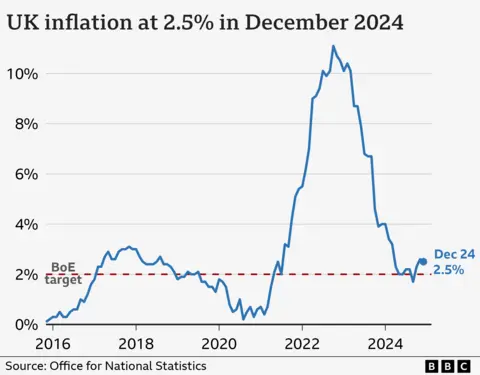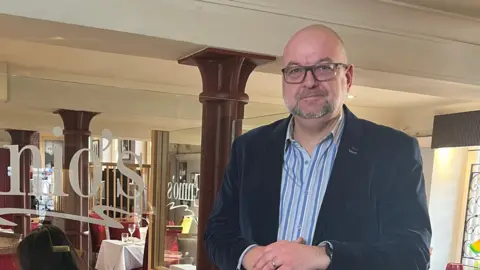
 Getty Images
Getty Images
UK inflation unexpectedly dipped in December, raising expectations of an interest rate cut next month.
Prices rose 2.5% in the year to December, down from 2.6% the month before, marking the first fall in inflation for three months.
The drop was driven by hotel prices falling and smaller rises in airfares than usual, but prices continue to rise faster than the Bank of England's target.
However, the latest figures ease pressure on Chancellor Rachel Reeves, who has faced criticism following a fall in the value of the pound and government borrowing costs hitting the highest level for several years.
"If it stays like this, we will be on route to slightly more interest rate cuts," Michael Saunders, a former member of the Bank of England's monetary policy committee which sets interest rates, told the BBC.
The Bank of England decided to hold interest rates at 4.75% last month, after policymakers said the UK economy had performed worse than expected, with no growth at all between October and December.
But Ruth Gregory, deputy chief UK economist at Capital Economics, said the inflation figure "strengthens the case" for a cut to 4.5% next month. Investors have also increased bets on the likelihood of a reduction.
Inflation is much lower than its peak in October 2022 when prices soared, pushing up the cost of living for households and leading to higher interest rates, which has made the cost of loans, credit cards and mortgages, more expensive.
Economists had expected inflation to remain unchanged last month.
Easing price rises for restaurants and falling hotel prices helped drive inflation lower, the the Office for National Statistics (ONS) said.
Prices for tobacco products, which include cigarettes, pouches, vape refills and cigars, also increased at a slower pace.
But Grant Fitzner, chief economist of the ONS, said this was offset by the rising cost of fuel and second-hand cars.
After the data, borrowing costs fell back to last week's levels and the pound rose slightly to stand at $1.22.
Chancellor Reeves said there was "still work to be done to help families across the country with the cost of living", but added the government had "taken action to protect working people's payslips from higher taxes" and increased the minimum wage.
But shadow chancellor Mel Stride said economic growth had been "killed stone dead by this government" and called for Reeves to "urgently explain how she will now achieve this".


In response to turbulence in the markets, it is understood Reeves will bring forward announcements for Labour's industrial strategy.
Jane Sydenham, investment director at Rathbones Investment Management, told the BBC's Today programme investors needed to "see some detail" on the UK's plans.
"Are there going to be some tax breaks for certain industries? I think specifics and action is what the market wants to see," she said.
Rising borrowing costs have a knock-on effect on the government's tax and spending plans, because it will have to pay more interest to finance its existing debt. That leaves less to spend on public services and investment.
Darren Jones, chief secretary to the Treasury, told the BBC public services would "have to live within their means".
When pressed on whether that sounded as though cuts were on the way, he replied: "It's just about prioritisation."
'You can only charge so much'


Jonny Gettings, director of operations at Italian restaurant and small hotel Ennio's in Southampton, told the BBC the outlook the business appeared "considerably worse" with increases to the minimum wage and national insurance contributions and reductions to business rates relief from April.
Mr Gettings added cutting staff working hours would be the "last scenario", but said the restaurant could look at shrinking its menu size, review its suppliers, or change opening hours.
"As soon as you increase the prices, you've got another bunch of problems to deal with, because then the worry is the customers will vote with their feet and they'll go and eat elsewhere," he added.
"You can only charge so much for a menu item before the guest is going to say, 'well, hang on a minute'."
Rent and bills rising
Some people have inflation-linked phone and broadband contracts, which means their bill will rise in April in line with the latest data.
Comparison website Uswitch said these bills are set to increase by an average of £21.99 per year for broadband and £15.90 a year on average for mobiles.
However, owing to new rules, lots of contracts now show any expected rises in pounds and pence each year during the course of the agreement.
Separate ONS figures released on Wednesday showed average rent costs rose 9% in December compared with a year earlier as UK house prices increased by 3.3% in the 12 months to November, with the biggest rise seen in Northern Ireland.
 (1).png)
 3 hours ago
1
3 hours ago
1


















